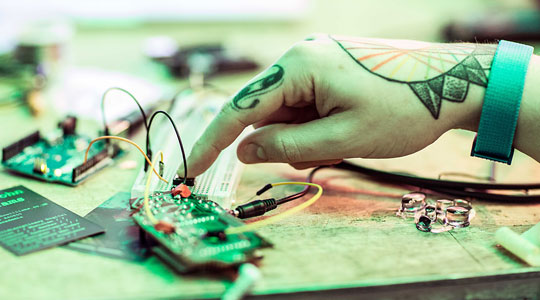Call for Participants - MusicMakers Hacklab

Perhaps the greatest musical culture shock in today's globalized world is not between one place and another, but between centuries of acoustic practice and new electronic possibilities. Today’s music technology represents a new culture, sometimes entirely alien to that which came before. It can make distances across geography and history vast, offering something radically new - or collapsed entirely, thanks to access to knowledge and tools.
This year's Hacklab engages in producing cross-cultural hybrids that imagine future topographies of sound and music performance. Participants will re-educate their electronic selves in the potentials of near and distant traditions, systems of musical representation and structure, and performance techniques. Our theme for experimentation is a kind of ethnomusicology for machines.
The hacklab is a collaborative, improvisatory, experimental environment for working together to conceive and realise new ideas in a week of intensive activity. We're looking for participants to share skills as:
- Musicians
- Composers
- Sound artists
- Inventors
- Developers
- Engineers
- Instrument builders
- Ethnomusicologists
- Singers
...and more, to work with ideas like:
- Mixing acoustic instrumental technology with analogue, optical, and digital technologies
- Imagining new notations or ensembles or playing techniques for new instruments
- Reconceiving electronic music through the filter of past and foreign musical traditions, and the other way around
We will begin the week with hands-on experiments in the building blocks of music - both acoustic and electronic. Then, we’ll progress toward a finished variety show of performances in the HAU2 theater space.
Hands-on instrument building input
Guest artists through the week will share skills in how instruments are made – both traditional and new.
Foremost among these is special guest Wukir Suryadi, one half of the Indonesian music project Senyawa. Mr. Suryadi will lead participants in learning music making techniques from Javanese tradition, fused with garage distortion into new forms.
Our co-facilitator Ewa Justka will add basic building blocks of electronic sound synthesis.
Public Presentations
The public is invited to visit several Hacklab talks during their weeklong session – entrance free:
Proto-electronic music, post-digital sound: Gamut inc's retro-futuristic machine music
Maciej Sledziecki and Marion Wörle (gamut inc)
Monday 1.2., 17:00 — Native Instruments Office
As gamut inc, Maciej Sledziecki and Marion Wörle have explored pre-20th Century experimental music practices during their biennial project, AVANT AVANTGARDE, and developed automated computer-controlled music machines that reflect these experiences.
At the HackLab, they will introduce some of the surprising electronic music predecessors that they have found, as well their own work. They will focus on the history of real and mystic music machines, the musical and philosophical implications of automated music, and their relation to present music production. Finally, they will showcase gamut inc’s own music-machines, and explain the technical and musical functions of their automata.
New instrument building and collaboration
Wukir Suryadi (Senyawa)
Tuesday 2.2, 17:00 — Native Instruments Office
Instrument builder and performer Wukir Suryadi (of Senyawa) talks about his work, drawing inspiration for instruments that combine Javanese tradition and contemporary invention.
He will provide insights into his unique construction methods, interweaving acoustic and electronic approaches, a discipline he shares with our Hacklab participants this week. He will also discuss his instrument builder collaboration, which drew together visual artists and musicians across Indonesia and Australia, curated by Kristi Monfries and Joel Stern.
100% No Modern Talking: The relation of technology and cultural practice exemplified by the software synthesizer Massive
Gösta Wellmer, Head of User Interface Design, Native Instruments
Thursday 4.2., 17:00 — Native Instruments office
Released in 2006 and marketed to techno producers, the Massive Synthesizer only began gaining popularity a few years later and within a different musical genre: dubstep.
What developments in media, culture and music led to its delayed success? How did the development team behind Massive anticipate its future use and was there inspiration from existing instruments? Gösta Wellmer, Head of User Interface Design at Native Instruments, tries to answer these questions based on interviews with the original development team, the examination of its preset sounds, and comparisons with other synthesizers.
2016 Participants
- Agustin Genoud
- Antonio quiroga waldthaler
- Arash Azadi
- Byrke Lou
- Claudia Fox
- Colin Frank
- Gisbert Schürig
- Gregor Glogowski
- Izabela Smelczynska
- Jan Nemecek
- Jee Young Sim
- Kevin Nelson
- Kinga Kozłowska
- Lisa Stewart
- Pedro Oliveira
- Rehab HAZGUI
- Rob Clouth
- Shih Wei Chieh
- Stanislav Nikolov
- Karin Weissenbruner
- Luis Sanz
Facilitators
Ewa Justka
Ewa Justka is a polish electronic noise artist, instruments builder and DIY electronics teacher based in London. Justka’s main field of research is based on exploration of materiality of objects, vibrant, ontological systems and an investigation of modes of quasi-direct perception through noise performance actions, interactive installation, DIY electronics, hardware hacking, plant-molesting, breaking, deconstructing and collaborating.
Wukir Suryadi
Wukir Suryadi's work is the product of a unique fusion of ancient Javanese tradition with contemporary music practice. His approach is informed by his rich cultural heritage and unique personal history which has lead him into methods of music experimentation which includes instrument building. His originally-build instrument shaped like a bamboo spear uses both percussive strings carved from the bamboo’s skin, and melodic steel strings, bringing together elements of traditional Indonesian instruments with garage guitar distortion.
Schooled in theatre, and one half of acclaimed band Senyawa, Wukir Suryadi brings theatrical ruckus to the classical stage, plucking, strumming and bowing his way from peaceful meditations to rhythmical frenzies. The evolution of his music is never complete as he uses the agility of his instrument to collaborate with musicians and performance artists from around the world, fluently bridging musical styles and inventing new instruments as he goes.
Peter Kirn
Peter Kirn is an audiovisual artist, technologist, and journalist. He is the editor of CDM (createdigitalmusic.com and createdigitalmotion.com), and co-creator of the open source MeeBlip hardware synthesizer. His work ranges from teaching creative coding with open tools to making experimental live techno, and as a writer has been a hub of discussion of trends in live and interactive visuals, and the design of new music technologies.
Facts
Details
Runs: 01.01 – 06.02.2016
Venue: Native Instruments Office
Times: daily 12 – 18:00
Final Presentation: 07.02.2016 at HAU2 17:00







































































